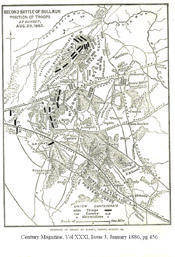
click on image for larger view
click on image for larger view
Second Bull Run
After leaving their bivouac the Fifth Army Corps marched to the old battle
ground of Bull Run, the
Corps being in position by 10 a.m. General Sykes’
division moved into place around 9 a.m. with
the First and Second Brigades
about 400 yards in advance of the Dogan house, with their left flank
resting
on the Warrenton turnpike. Two forests masked enemy movements to the
front and left of this
position. Almost immediately Confederate artillery,
placed just behind a crest to the front of the
Brigade, started a heavy
bombardment which lasted until about 3 p.m. During this bombardment
the
Fourth US had one killed and three wounded. The brigade of General
Butterfield, previously to the Regiment’s
right, was advanced into the woods,
at which time the Fourth and Fourteenth Regiments were obliquely moved
to the right and forward, advancing to the rear of the woods occupied by
General Butterfield’s brigade
where they remained until mid afternoon. At
that time, General Butterfield’s brigade came under heavy
enemy attack.
The two battalions of the Fourteenth Regiment were advanced in support
and acted
as a rear guard until Butterfield’s brigade had withdrawn. At that
time (about 3:30 – 4:00 p.m.), the
Fourth and Fourteenth Regiments were
ordered to the rear. It was during this withdrawal that Captain
Joseph B.
Collins, in command of the Fourth
US, was wounded and command was
assumed by Captain Hiram
Dryer. During the period the Regiment was
in the woods it was under a continual fire from the
enemy.
The Regiment took up positions on a line with the Dogan house - about 1200
yards
to the rear of their previous position. About 5 p.m. the Brigade was
redeployed on a plateau on the
other side of the turnpike. About 6 p.m. the
Third, Fourth, Twelfth, and Fourteenth Regiments received
orders to advance
about 500 yards and support General Meade’s brigade, then being severely
pressed
by enemy troops. On reaching General Meade’s troops, the Fourth
US opened fire by battalion, firing 6
rounds. They found that the enemy was
performing a flanking movement with several brigades and the
Fourth US
was ordered to the left where it took up position on a road immediately in
front of the
woods where the enemy forces were expected to make their
appearance. Shortly thereafter, the Confederate
troops came into the open
only 20 to 30 yards from the position of the Regiment. The regiment, firing
by battalion, was able to deliver 3 rounds before the enemy recovered and returned fire. At that time,
receiving
orders to retreat (the Brigade being flanked and running low on ammunition), Captain Dryer gave
the command
to face about, marched in line of battle about 30 yards, did another about face and delivered
another volley.
Under
heavy enemy fire the Regiment once again did an about face, marched another 60 yards, and faced
about.
With part of the Regiment being covered (behind) another regiment, the order was given to fire by wing.
Firing by wing, another two rounds were delivered, at which time the Regiment was ordered to retire back
to
its position on the plateau. Shortly after arriving at the plateau, the Brigade was ordered to retire
to Centerville,
some five miles distance. The Brigade arrived at Centerville about midnight where they
took up positions in old
Confederate rifle pits.
During the day the Fourth US loss was one sergeant and two privates killed, one
officer, one corporal, and thirteen
privates wounded.